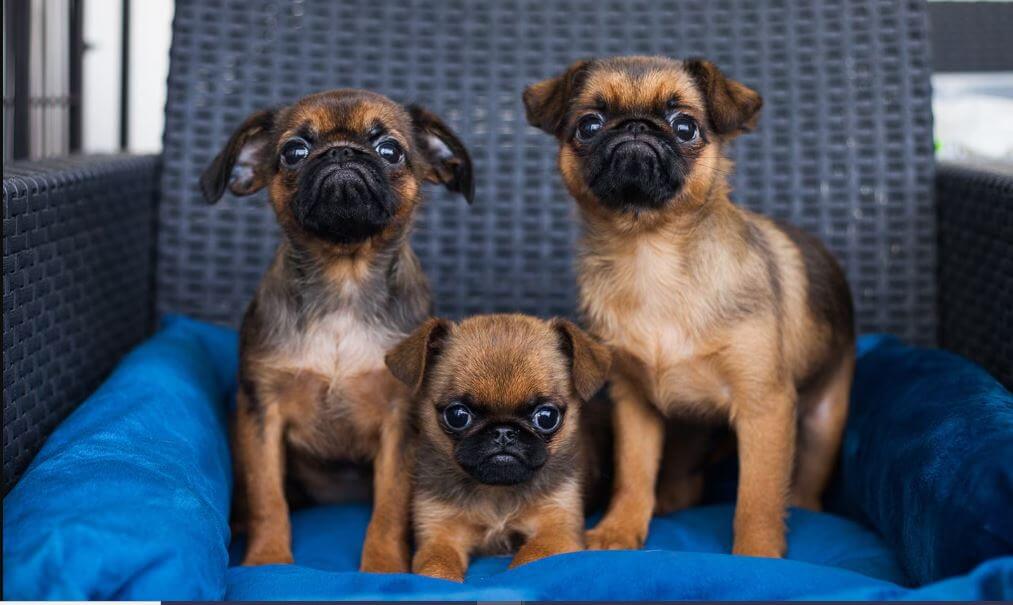
Brussels Griffon
The Brussels Griffon is a small, affectionate dog breed with a charming personality and a distinctive look. Originating from Brussels, Belgium, this breed was initially used as a rat-catcher and watchdog. However, it quickly became popular among Belgian aristocrats and eventually gained attention worldwide.
Here are some key features of the Brussels Griffon breed:
1. Appearance
- Size: Brussels Griffons are small, typically weighing between 7 to 12 pounds and standing about 7 to 10 inches tall.
- Coat: They come in two coat types: the rough coat and the smooth coat. The rough coat is dense, wiry, and requires grooming, while the smooth coat is shorter and softer.
- Face: One of the breed's most recognizable features is its expressive, human-like face, which can resemble a little "Griffon." Their wide, round eyes, short snout, and distinct beard and mustache give them a unique and endearing appearance.
2. Temperament
- Affectionate: Brussels Griffons are known for their strong attachment to their owners. They are highly affectionate, often bonding closely with their family members.
- Loyal and Alert: They are loyal and often alert, making them excellent watchdogs. They can be a bit wary of strangers but are usually friendly and playful once they feel safe.
- Intelligent: Despite their small size, these dogs are quite intelligent. They are quick learners, although they can sometimes be stubborn.
- Energetic: Though small, Brussels Griffons are energetic and playful. They enjoy playtime and short walks but don't require excessive exercise, making them suitable for apartment living.
3. Health
Essentials for Your Newly Adopted Pet
Welcoming a shelter pet into your life is a beautiful journey. Here are some handpicked items to help your new friend feel safe, loved, and right at home:
- Life Expectancy: The Brussels Griffon has a lifespan of around 12 to 15 years.
- Common Health Issues: Like many small dog breeds, they can be prone to health issues, such as breathing problems due to their short snouts (brachycephalic), dental issues, and eye problems. Regular vet visits and a healthy diet are essential for maintaining their health.
4. Care and Grooming
- Grooming Needs: Rough-coated Brussels Griffons need regular grooming to prevent mats and tangles. The smooth-coated variety requires less maintenance but still benefits from occasional brushing.
- Exercise: While they don't require heavy exercise, daily walks and interactive playtime are important to keep them healthy and happy.
5. Training
- Brussels Griffons are intelligent but can be a bit stubborn, so consistent, positive reinforcement-based training is essential. Early socialization is also important to help them feel comfortable around other pets and strangers.
6. Best Environment
- The Brussels Griffon is well-suited to apartment living due to its small size and moderate exercise needs. However, they do well in homes where they are not left alone for long periods, as they crave companionship and can become anxious or develop behavioral issues if neglected.
Conclusion
Brussels Griffons make excellent companions for those who can give them plenty of attention and affection. Their unique look, playful nature, and loyalty make them popular with dog lovers, especially those who live in smaller spaces. However, potential owners should be prepared to provide regular grooming and consistent training to ensure a happy, healthy relationship with this charming little dog.
Affiliate Products
Up to 75% Discount

Dog Collar with Health Monitoring
BUY NOW »
Up to 55% Discount

Luxury Faux Furhuge Napping Bed
BUY NOW »

